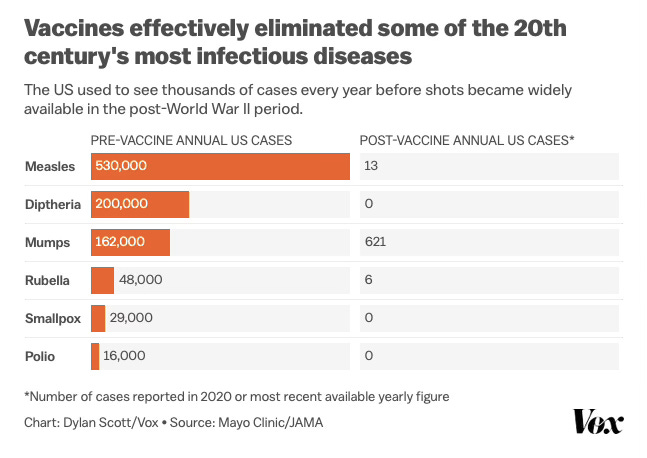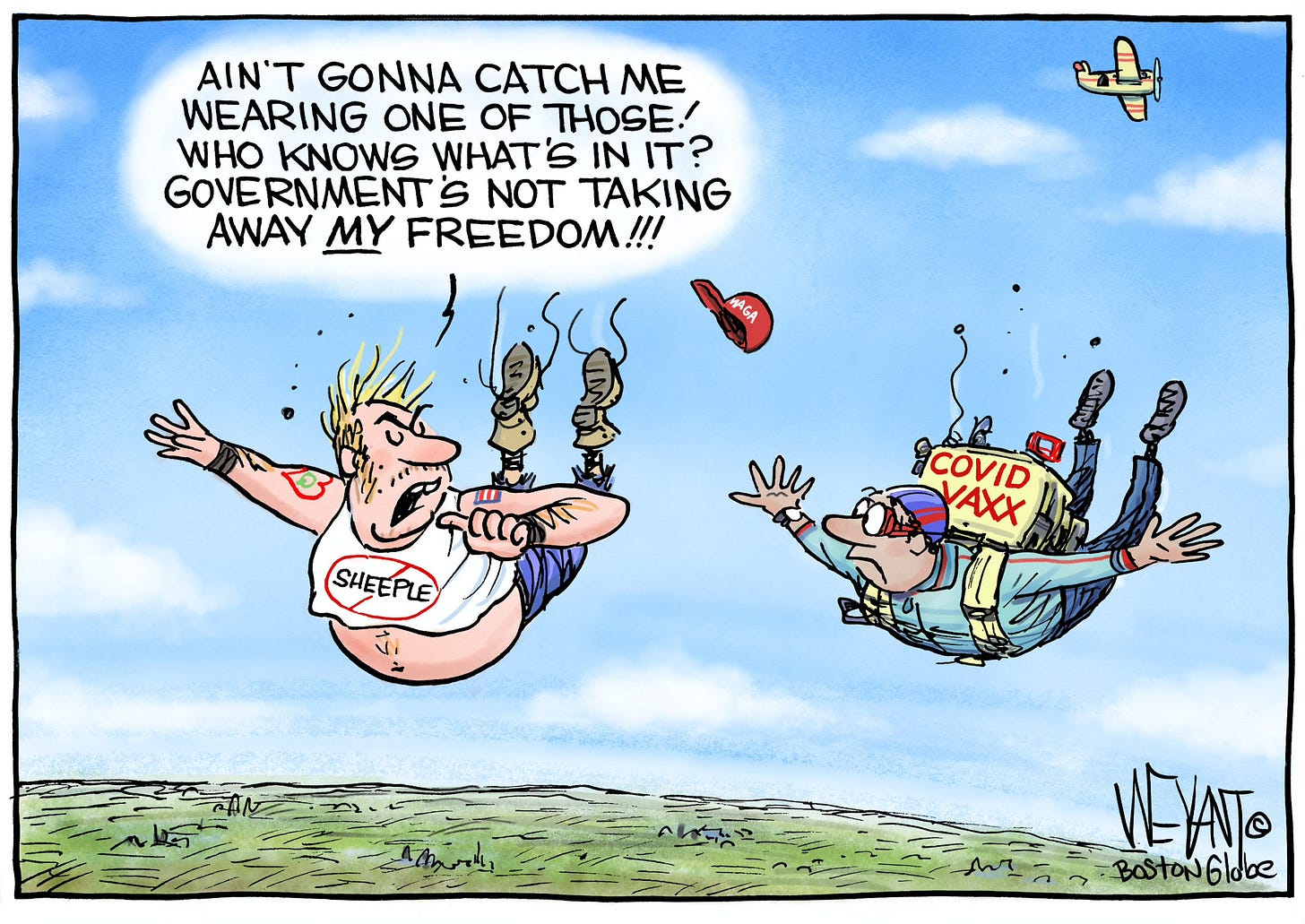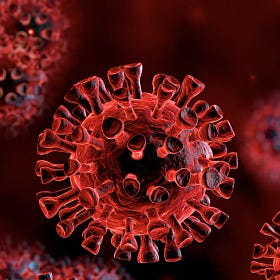Vaccination!
Medical science's greatest achievement.
UPDATED: January 27, 2026
Welcome to the Healthy Living Is Good Medicine Newsletter, presenting timely, science-based, original articles covering a wide range of preventive medicine and public health topics, along with critical commentaries on the politics and economics of the American healthcare system.
Vaccination is undoubtedly one of the most significant medical achievements of all time. Beginning with with Edward Jenner's smallpox vaccine in 1796, vaccination remains a cornerstone of modern medicine and public health.
Among medical science's many advances, vaccination is widely regarded as the single intervention that has saved the most lives globally. According to the World Health Organization (WHO), global immunization efforts have saved at least 154 million lives over the past 50 years.
While antibiotics and sanitation have also had great effects on saving lives, the long-lasting, far-reaching, and cost-effective benefits of vaccination make it a standout among public health practices. By stimulating the body's own immune system to recognize and fight off specific diseases, vaccines have revolutionized healthcare.
Widespread vaccination has resulted in healthier populations and longer life expectancies, while saving billions of dollars in healthcare costs. Vaccines have eradicated smallpox, and have nearly eliminated polio. Childhood vaccines have dramatically reduced mortality and complications due to measles, mumps, diphtheria, and pertussis.
If you don’t believe what an incrdible game-changer vaccines have been, simply ask your grandparents about the polio pandemic. To counter the current anti-vaccine insanity, there’s now an organization for grandparents who are dedicated to protecting their grandchildren through vaccinaton. As Jess Steier puts it, “Grandparents have the lived experience. Grandchildren still have the capacity to listen. Together, they cut through the noise.”
Some vaccines can benefit pubic health by achieving herd immunity, which protects the unvaccinated and vulnerable populations such as infants, the elderly, and the immunocompromised. The overwhelming scientific consensus supports the safety and efficacy of vaccination programs. For more on vaccine safety trials, see:
The highly effective HPV vaccine prevents certain cancers, and its benefits are now well documented. Recent evidence suggests that the current Shingles vaccine lowers the risk of dementia and cardiovascular disease. Vaccine research continues making progress against stubborn diseases such as HIV/AIDS and malaria, and is exploring personalized cancer vaccines and universal influenza and covid vaccines.
One out of three Americans mistakenly believe that the COVID-19 vaccines caused thousands of sudden deaths. The majority of the American public is known for being gullible and prone to scams and cons of all kinds, economic and political. Consequently, anti-vaccine propaganda abounds.
I do expect better from physicians, and find it difficult to comprehend why some would be against vaccines. One doctor I knew belonged to a quasi-religious anthroposophic community, and had been indoctrinated with their misguided beliefs. Another doctor of my acquaintance built up a thriving practice by catering to patients seeking alternative treatments such as ivermectin, despite it being repeatedly demonstrated as ineffective.
There are far too many doctors who have been unable to deconstruct the anti-vaccine pseudoscience infesting their belief systems. I have no qualms about referring to them as quacks. Unsurprisingly, anti-vaccine physicians have been finding support among chiropractors, acupuncturists, herbalists, naturopaths, and other non-medical practitioners.
A 2023 analysis identified 52 U.S. physicians in different medical specialties who were propagating COVID-19 misinformation about vaccines, treatments, and masks, on large social media and other online platforms. It is disreputable for any physician to either explicitly promote anti-vaccine attitudes or implicitly enable anti-vaccine activists and their disinformation. Shame on them, and on their respective Medical Boards for failing to intervene. Kudos to SCOTUS for rejecting their “free speech” bid for protection from Board disciplinary action. The reality is that the COVID-19 vaccines have a huge amount of evidence for safety and efficacy.
Being Pro-Vaccine
I haven't found a way to be “fair and balanced” about the subject of vaccination. One only needs to visit cemeteries and compare the percentage of children's graves prior to pediatric vaccinations with the present day, in order to be personally impressed by the evidence in favor of this medical intervention.
Since the beginning of the COVID-19 pandemic I have invested considerable time and energy promoting a multi-layered approach to prevention that includes masking and vaccination. It is important for me to clearly take sides on this issue, because my neutrality or silence would only benefit the perpetrators of vaccine disinformation.
Please know that if I block anti-vaccine rhetoric, it is for the same reason that I flush the toilet in a public restroom: Nobody needs to see that crap!
I'd much rather face any real or imagined adverse effects of an FDA-approved vaccine than take my chances with the known risks of the disease from which it is intended to protect me. So, I’m up-to-date on all of them. It would be great if the current COVID-19 vaccines were as effective against infection as the measles vaccine, but they aren't.
Hopefully, future vaccines against COVID-19 will be more durable and provide broader protection against future strains, preventing people from contracting the illness and reducing its severity in the event of a breakthrough infection. Unfortunately, I can no longer trust the CDC’s vaccination schedules when there is an anti-vaxxer in charge of HHS and the true experts on the CDC’s immunization advisory committee dismissed. This is a reliable source:
Being Vaccine Hesitant
There is an important distinction to be made between being vaccine-hesitant and being anti-vaccine. The former involves personal choice, even if it is based on a faulty understanding of the science or is misguided due to erroneous information or religious beliefs. Growing vaccine hesitancy has resulted in a resurgence of measles and chickenpox in the U.S. The recent measles outbreak in Texas has already resulted in one child’s death.
All U.S. states and territories currently require children attending childcare centers and schools be vaccinated against measles, mumps, polio, tetanus, whooping cough and chickenpox. However, all states allow exemptions for children with medical conditions that prevent them from receiving certain vaccines, and most also permit exemptions for religious and non-medical reasons. The number of exemptions has been increasing in recent years.
Misinformation gets propagated when people share false or inaccurate information, without an intention to lie or deceive others. Disinformation involves promoting lies and misleading information, and deliberately spreading it in order to deceive people. It is typically done to further covert objectives, such as the pursuit of profits, pushing a political agenda, or as a propaganda tool used to manipulate the masses.
Anti-vaccine activists will use any means they can to persuade others that they and their children should not get vaccinated. That includes creating disinformation campaigns that spread lies about vaccines, such as vaccines causing autism or DNA damage, or that they contain tracking microchips.
Here’s what every parent needs to know about childhood vaccinations:
As for the (mostly) senseless debate about which is better, “naturally acquired immunity” versus “vaccine acquired immunity,” here’s the bottom line:
Freedom of Choice
Informed consent is a standard applied to any medical treatment or surgical procedure that carries with it a risk of harm. A patient's consent hinges upon being fully and truthfully informed about the risks before making their decision. The problem with misinformation and disinformation is that people are not being given honest information on which to base their choice.
Anti-vaccine activists have more recently shifted their focus from telling lies about vaccine safety to making the issue one of “freedom of choice.” That’s so people can be free to make dumb choices based on faulty information. The anti-vaccine movement apparently thought a “freedom” motif would get better traction with legislators, adding that strategy to its playbook.
It sometimes seems that the very people who are pushing freedom of choice when it comes to vaccination are the same ones who are against women choosing not to give birth to unwanted children, even after being deprived of the choice not to get pregnant by their rapists. Some proponents of forced birth would even like to bar women's access to contraception because of their religious beliefs.
For those people, the concept of religious freedom means being free to impose their particular beliefs upon others. For examples, one need look no further than the ethics-free U.S. Supreme Court, whose Catholic majority overturned the half-century precedent established by Roe v. Wade.
A Vaccine Disinformation Disaster
RFK Jr. visited Samoa in June, 2019. While there, he met with local anti-vaccine activists to publicly criticize their government's vaccination program and promote falsehoods about vaccines causing autism. There is no shortage of false claims that he has made.
Samoa had a dangerously low vaccination rate since 2013, attributed to concerns over vaccine safety that were fueled by international anti-vaccine groups, such as Kennedy's “Children's Health Defense.” The organization paid him $326,000 in 2024 for his 15 weeks of work as its chairman. This is an example of how being anti-vaccine can make someone rich.
Much of the organization's efforts involve lawsuits. Its anti-vaccine rhetoric, spread through social media and other channels, played a significant role in influencing public opinion in Samoa, and greatly amplified a fear of vaccines and distrust of health officials.
The highly contagious measles virus arrived in Samoa in September, 2019, and by October the islands were experiencing a devastating measles outbreak. In November, a state of emergency was declared, and Kennedy wrote to the Prime Minister with the intent of dissuading him from implementing vaccine mandates.
To the Samoan government's credit, an aggressive vaccination campaign was initiated. Herd immunity was achieved by the end of 2019, with 93 percent of the population vaccinated. By the time the outbreak was over, more than 5,700 people had been infected, and 83 had died, most of them children under five years of age.
Complications of measles infections include permanent hearing, vision, and cognitive impairments. This preventable, tragic event is still having an impact upon the quality of life for many Samoans. RFK Jr.’s visit and his messaging during Samoa’s measles crisis have been widely criticized. Samoa’s top health official called RFK Jr.’s assertions that the deaths weren’t due to measles “a complete lie,” and accused his rhetoric of fueling further vaccine distrust. Health experts around the world have confirmed that RFK Jr.’s influence worsened a situation that was already primed for misinformation.
Trusting a Wolf to Guard the Sheep
I just about had a conniption fit when I heard that RFK, Jr. was in line for Trump’s cabinet position as the head of the Department of Health and Human Services (HHS). Despite having an empty yet catchy “Make America Healthy Again” slogan, a scientifically illiterate, anti-vaccine propagandist such as Kennedy is totally unsuitable as the head of our nation's top health department, but there we are. So far, his response to measles outbreaks in Texas has been totally inappropriate and ineffective.
Putting aside his “medical freedoms” argument, this wolf in sheep’s clothing claims to be on the side of “protecting the public” by making school lunches healthier, which is badly needed. However, he would also be calling for more vaccine safety studies, when their adverse effects are already being routinely monitored, and further clinical trials would be medically unethical.
Promoting vaccine conspiracy theories and undermining the government institutions charged with protecting the public’s health could prove disastrous for our nation if H5N1 bird flu becomes a pandemic. Junior’s response so far has been to ban testing of dairy workers and suppress the release of infection data by the CDC. It sounds more like a prescription for making Americans dead again, when we’re hit by the next pandemic.
Calling for studies that include looking at the long-term impact of vaccines on future cancer rates, possible impairment of fertility, and potential genetic damage that might be passed down to subsequent generations deliberately set an impossibly high bar for proving vaccine safety. When such studies do not exist, disingenuous arguments can be made for improbable risks that are used to block or rescind vaccine approvals. The anti-vaccine activists who argue “possible” risks should rightly bear the burden of proof, not the scientists who base their medically conservative and well-reasoned conclusions on what is most likely to be true.
Why anyone in their right mind would want to sow fear and doubt about something that saves lives bewilders me, unless it is part of a money-making scheme. If you follow the money you can see how Kennedy and the ivermectin doctors are profiting from their vaccine disinformation. There are also distinct psychological profiles associated with those who hold contrarian beliefs and anti-vaccination attitudes, according to a 2023 analysis. Those profiles mainly involve anti-science biases and political extremism.
People tend to mistrust the unfamiliar, such as the current COVID-19 vaccines that make use of new mRNA technology. As might be expected, there were flaws in the mRNA vaccines’ clinical trials upon which the FDA based its emergency approval early in the pandemic. There were bound to be problems with any “Operation Warp Speed” rush to development. However, the fact remains that the expedited delivery of vaccines into people's arms saved countless lives in America and abroad. Alarmingly, someone with a luddite mentality and a worm in their brain has cut funding for mRNA research in the United States.
It will be a very long time, if ever, before we’ll know if those who survived the pandemic because of the vaccines had made a “bargain with the devil” and will have to pay up later, not with their souls but with adverse consequences for their future health. At this point in the game, I seriously doubt that there will be any long-term effects worth making a fuss about.
So, please don’t put off getting your seasonal vaccines. Check on the latest vaccine recommendations from the CDC. If the cost is currently subsidized by federal programs, be aware that it might not be the case in 2025 under the new administration. Who knows what might happen to our healthcare if Medicare, Medicaid, and VA coverage become privatized, as has been suggested by some of those who are about to assume positions of power.
Nothing New About Vaccine Mistrust
People don’t trust vaccinations for a number of reasons. Some believe that if they are leading what they think of as a “healthy life” they don't need vaccines to protect them from illnesses. Others insist on their “bodily autonomy” and would feel violated if someone jabs them with a needle. They fail to grasp the nuanced balance between individual freedom and the public good, and the importance of achieving herd immunity whenever possible. Then, there are the outright lies about vaccination being motivated by profit:
Some people simply have a needle phobia, or are unwilling to accept even minor vaccine reactions such as tenderness at the vaccination site or a low-grade fever. Vaccination resistance has a long history in the United States:
Too many people remain under the thrall of conspiracy theories that suggest sinister motives behind vaccination campaigns. Anti-vaxers tend to believe that vaccines cause a variety of harms that the government is hiding or that the medical establishment is unwilling to admit, even in the absence of credible evidence. One of their most preposterous claims is that the vaccines were never tested against placebos.
Others mistakenly believe that vaccine safety issues should be detected before a vaccine has been authorized for emergency use, even when adverse effects are so rare that millions of people would have to be vaccinated before they could be detected. They simply won’t trust a system that doesn't admit to non-existent vaccine harms.
Some parents, doing their own online “research,” have their heads filled with falsehoods about vaccine safety. Physicians can encourage misguided parents to read A Parent’s Guide to Understanding Vaccines by Dr. Alyssa Robinson.
Vaccine misinformation runs rampant on all the social media, and recently published survey data shows that misinformation about COVID-19 vaccines is higher now than it was three years ago. Unscrupulous practitioners hawk alternative treatments. Online trolls stoke fears, conspiracy theories, and erroneous beliefs, including the “lab leak” theory. The latest reanalysis of genomic data confirms zoonotic spillover in the Wuhan wet market was the origin of the pandemic.
Some people bristle at the idea of anyone telling them what to do, especially the government. Their infantile rebelliousness might also apply to laws that require wearing seat belts in motor vehicles, and prohibit driving while intoxicated. They take vaccine mandates as a personal affront.
Then, there are many who are poorly educated and don't have enough scientific literacy to rationally weigh the potential risks against the intended benefits of vaccination. A newly published study suggests that COVID-19 vaccine refusal is driven by deliberate ignorance and cognitive distortions.
About half of eligible Americans plan to skip the next round of COVID-19 and flu vaccinations, according to a national survey. Of those who had been previously vaccinated, only 37 percent intended to do it again.
A recent Pew poll found that about 60 percent of respondents said that they probably wouldn’t get an updated covid vaccination, despite the CDC’s recommendation that everyone do so. Most of those people gave reasons such as concern about side effects or that they didn’t think they personally needed it.
Among people aged 65 and older, 45 percent said they probably won’t get the vaccine. But, there is some good news: Currently, nationwide coverage of COVID-19 vaccination for seniors is 39 percent. That’s already slightly higher than their total coverage for last year’s season and far above what it was at the same time last year.
Ensuring Vaccine Safety and Efficacy
In an ideal world, all therapeutic interventions would be studied in double-blinded, randomized clinical trials (RCTs) that include high-quality control arms. The studies would fully disclose all data for independent, objective analysis, and there would not be even a slight appearance of conflicts of interest by the researchers.
That is never going to happen, for both practical and ethical reasons. Human vaccine trials are insanely expensive, and are unlikely to be conducted by organizations other than pharmaceutical companies that stand to make a profit if their vaccine is approved. It would also be highly unethical, if not illegal, to withhold already approved vaccines from a control group, thereby exposing them to unacceptable risks, including vaccine-preventable deaths.
In facing a pandemic that has since killed well over a million Americans, there wasn't the luxury of time in which to get things done perfectly. Mistakes were made by government agencies, and there were unanticipated consequences for decisions that were made in good faith. School closures did more harm than good. Vaccine mandates were enacted in the hope of achieving herd immunity, but the novel coronavirus mutated too quickly for that strategy to work. Hindsight has 20/20 vision, but the reality is that there was simply too much the scientists didn't know at the time.
Creating roadblocks to vaccine approval and its widespread use is similar to the strategy employed by tobacco companies when the earliest statistical associations between smoking and lung cancer were discovered. In order to delay any restrictions on their profitable, addictive, and harmful products, the industry kept funding new studies and urging medical organizations to wait for the results before presenting any conclusions about the potential health risks of smoking.
Realistically Weighing the Risks
If you’re hesitant about COVID-19 vaccination and aren’t convinced that the benefits far outweigh its minuscule risks such as myocarditis, Dr. Wilson breaks down the risks versus benefits here:
Being up-to-date with one’s Covid vaccinations clearly reduces the risk of complications from breakthrough infections. Yet, among adults 75 years of age and older, a group known to be at much higher risk for hospitalization and death, only 42 percent had received the 2023-2024 COVID-19 booster. It seems that getting older doesn’t automatically make people wiser.
It would be prudent for everyone, regardless of their age and health status, to avoid severe infections and reduce the risk of Long-COVID by getting the latest vaccine. Vaccination during pregnancy protects newborns from hospitalization, according to new CDC data. When the most vulnerable people don’t take reasonable precautions to prevent COVID-19 infection, and minimize its severity should it occur, it’s like playing with fire.
The race between slowly changing vaccines and the rapidly mutating coronavirus is expected to continue, with the virus maintaining its lead. Until we have a vaccine that can prevent the majority of infections, the best reason for vaccination is to reduce the likelihood of severe complications if people should become infected.
Weighing Risks Against Benefits
We keep coming back to “risks versus benefits” estimates. What are the known and potential risks of treating compared to not treating? What are the known and potential benefits of treating compared to not treating? How do we know if booster vaccinations actually work?
If we, as physicians, are committed to first doing no harm, considering the most current research findings available and taking into account that some of them may not be reliable, can we still, in good conscience, recommend the commonly administered vaccines? The answer is a resounding, “Yes!”
Physicians and surgeons must repeatedly make decisions that can have serious consequences for their patients’ health, including matters of life or death. For those who take their responsibility seriously, it can be quite stressful. Practicing medicine comes with high burnout rates and an increased risk of suicide due to occupational stress.
Given the “big picture,” I think we can all feel comfortable knowing that despite the human imperfections that can infect research, the science behind vaccination remains solid. However, if you are a physician who doesn't trust the science, then why are you practicing medicine? Quack doctors should be avoided. They’re dangerous, and do not represent our profession.
This Post may be updated at any time. Please check back here again to find the latest information on this subject.
Find more articles about Healthy Living in my Post Archive.
Please share my Website Link with others via your social media accounts.
You can help your friends and followers become healthier by suggesting that they subscribe to this Newsletter. You may receive access to premium features as a thank-you for making referrals:
If you find this Newsletter of value, and want to lend your support, please make a donation that will help it reach many more people:














